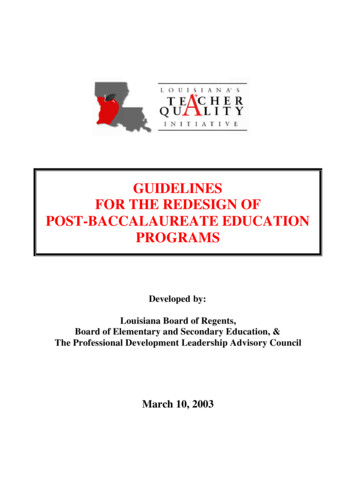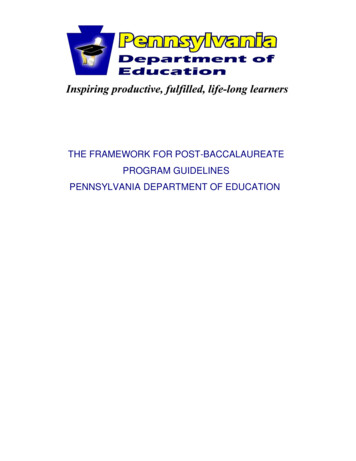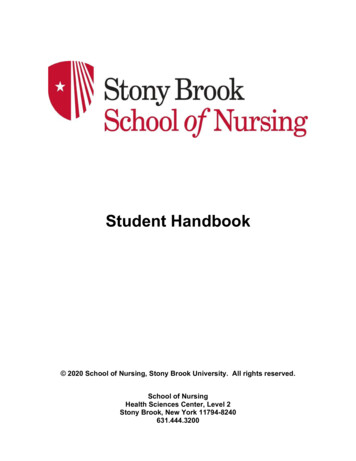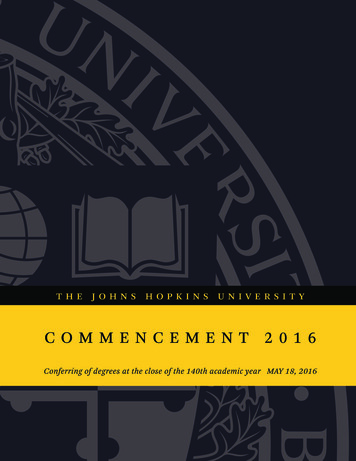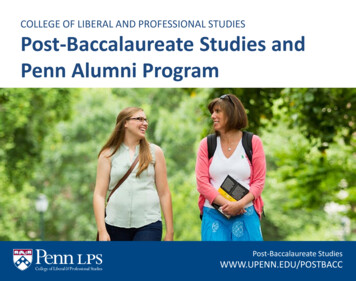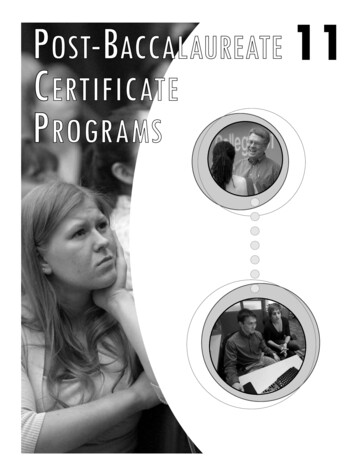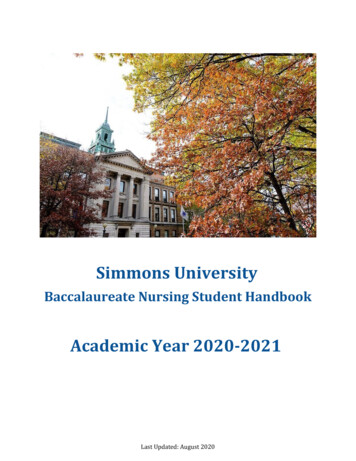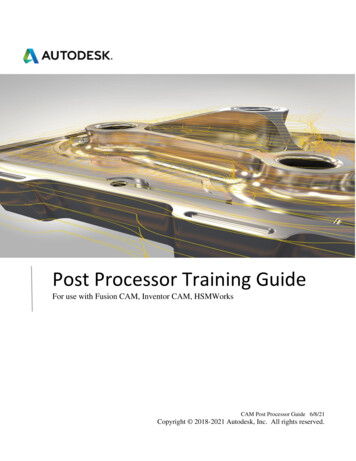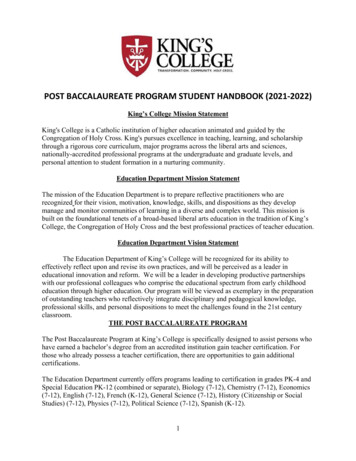
Transcription
POST BACCALAUREATE PROGRAM STUDENT HANDBOOK (2021‐2022)King’s College Mission StatementKing's College is a Catholic institution of higher education animated and guided by theCongregation of Holy Cross. King's pursues excellence in teaching, learning, and scholarshipthrough a rigorous core curriculum, major programs across the liberal arts and sciences,nationally-accredited professional programs at the undergraduate and graduate levels, andpersonal attention to student formation in a nurturing community.Education Department Mission StatementThe mission of the Education Department is to prepare reflective practitioners who arerecognized for their vision, motivation, knowledge, skills, and dispositions as they developmanage and monitor communities of learning in a diverse and complex world. This mission isbuilt on the foundational tenets of a broad-based liberal arts education in the tradition of King’sCollege, the Congregation of Holy Cross and the best professional practices of teacher education.Education Department Vision StatementThe Education Department of King’s College will be recognized for its ability toeffectively reflect upon and revise its own practices, and will be perceived as a leader ineducational innovation and reform. We will be a leader in developing productive partnershipswith our professional colleagues who comprise the educational spectrum from early childhoodeducation through higher education. Our program will be viewed as exemplary in the preparationof outstanding teachers who reflectively integrate disciplinary and pedagogical knowledge,professional skills, and personal dispositions to meet the challenges found in the 21st centuryclassroom.THE POST BACCALAUREATE PROGRAMThe Post Baccalaureate Program at King’s College is specifically designed to assist persons whohave earned a bachelor’s degree from an accredited institution gain teacher certification. Forthose who already possess a teacher certification, there are opportunities to gain additionalcertifications.The Education Department currently offers programs leading to certification in grades PK-4 andSpecial Education PK-12 (combined or separate), Biology (7-12), Chemistry (7-12), Economics(7-12), English (7-12), French (K-12), General Science (7-12), History (Citizenship or SocialStudies) (7-12), Physics (7-12), Political Science (7-12), Spanish (K-12).1
For candidates pursuing certification in one of the areas noted above and who hold a degree inone of the above subject areas, the typical time to completion is 18 months. For candidatesseeking a certification in an area in which they did not receive the equivalent bachelor’s degree,an accurate frame cannot be established until there is a formal review of a candidate’s transcriptsfrom all college courses taken.Please note: The Pennsylvania Department of Education (PDE) will stop issuing SpecialEducation PK-8 and Special Education 7-12 certificates as of December 31, 2021. If onecurrently holds a SPED PK-8 or SPED 7-12 certificate, one may apply for an “expansioncertificate” even if one does not have a content area in the new grade bands.In order to apply for the “expansion certificate” one will need to follow either of two routes:1) take the tests for special education in the grade band you want to add or2) take the missing course work/field experiences that are missing.The Education Department has reviewed our current SPED PK-8 and SPED 7-12 coursework toidentify what one needs to take if one wants to proceed with seeking the expansion certificate:If one completed a King’s Special Education PK-8 and wants to add Special Education 7-12Expansion Certificate, one will need to take a transition class (EDUC 314) which includes a fieldexperience. The department offers this class in the spring semesters.If one completed King’s Special Education 7-12 and wants to add Special Education PK-8Expansion Certificate, you will need to take either (EDUC 260 and EDUC 390) or (EDUC 510and EDUC 516). EDUC 510 is offered in the fall semester. EDUC 516 does offer a fieldexperience working with children. EDUC 260 is offered in the spring semester which will beduring the day. EDUC 390 can be taken the following fall. If you are interested in enrolling inEDUC 260 and EDUC 390, please contact Brother Stephen LaMendola, Director of the PostBaccalaureate Program: stephenlamendola@kings.edu.If interested in enrolling in EDUC 510 and EDUC 516, contact Christine Stevens, Director ofGraduate Admissions: christinestevens@kings.edu.All the above listed courses can be used for ACT 48 credits.To be enrolled in the Post Baccalaureate Program, in addition to possessing a bachelor’sdegree, a candidate must normally possess an overall GPA of 3.0 at the time of theirundergraduate graduation. Candidates must also be willing to learn how to access the“Moodle” program for hybrid courses, as well as become familiar with the department’srecord keeping program “Task Stream.” Following registration, all communication fromthe Education Department will be sent to the student’s King’s College e-mail, which shouldbe checked frequently.Courses in the Post Baccalaureate Program are offered in a variety of settings including hybrid,accelerated, days and evenings. Some courses, such as methods courses, must be completed2
on-campus. Most education courses also require field experiences that require our candidates tobe in schools during the school day, when schools are in session. Before students are allowed tobegin their field experiences, all necessary clearances must be submitted. For further informationon clearances, check:www.kings.edu/academics/undergraduate majors/education/formsAdditional information concerning the policies and practices of the Education Department maybe found in the Education Student Handbook:www.kings.edu/academics/undergraduate majors/education/handbooksClass AttendanceFor most blended Moodle courses, students will be required to meet one evening on campusduring the first week and one evening during the last week of the course. Meeting attendance isrequired for all campus meetings to pass the course. The meeting times and room locations willbe set by the instructor and be sent to you via your King’s College e-mail or posted on thecourse’s Moodle site.For courses taught on campus, each instructor will explain the attendance policy for his or herown course, including the conditions under which missed course work may be made up and thenumber of absences permitted before penalties may be incurred.as week of the course. Allcampus meetings are required and you must attend in order to pass the course. However, due tothe goals and objectives of individual courses, students may only be required to meet one timethe first Student Teaching/Special Education Culminating Field ExperienceCandidates who do not already possess a teaching certificate will have to complete a semester ofstudent teaching. This is normally a 16-week program that involves being at an assigned schooleach day the school is in session during this period. Candidates are expected to follow theschool’s policy for faculty regarding arrival and departure times.Currently, candidates seeking a Special Education Certification (and who already possess ateaching certificate) will be required to complete the course requirements for special educationand a special education culminating field experience which will require 125 hours in a specialeducation setting, normally on a grade level other than their general education certification.Post Baccalaureate Admission ProcessTo begin the process of enrolling in the Post Baccalaureate Program: A candidate is requested to contact the department’s Administrative Assistant, JaniceGavlick – janicegavlick@kings.edu -who will send the candidate a letter of introductionand an initial interest form and direct the candidate to the King’s College Post time/fast track certificationThe prospective candidate will then return the initial interest form, along with alltranscripts from their undergraduate program. If the candidate has a graduate degree in a3
relevant education area, that transcript should also be sent. Unofficial transcripts sufficeat this juncture; however, if a candidate pursues entrance into the program officialtranscripts will be required. The Education Department will only accept up to one-half of the education creditsnecessary for a particular certification from another educational institution. Majormethods courses, student teaching and special ed culminating experiences cannot betransferred and must be taken at King’s. After all items have been sent back to King’s and reviewed, the Post BaccalaureateCounselor (Brother Stephen LaMendola )will contact the candidate for an interview. Following the interview with Brother Stephen, a candidate will be admitted to the PostBaccalaureate Program on a probationary basis and assigned an Educational Advisorwho will assist the candidate in registering for future courses.Tuition and Fees2021 – 2022 Academic Year One-time Application Fee: 25 – check made out to King’s College/Educ. Dept.(waived for King’s alums) 337 per tuition credit: maximum of 11 credits per semesterOne-time Task Stream Fee: 138 (This provides a student with an electronicportfolio which may be “packed up” after course work at King’s has beencompleted.)There also will be a Student Teaching or Special Ed Culminating Experience Fee (EDUC 417,EDUC 467 or EDUC 447) of 275 charged during the semester of those experiences.Preferred payment: Entire payment is requested by the initial class meeting. If not possible, atleast one-third is required prior to the first meeting and the remaining amount will need to bepaid by the last day of class.If an outside agency is paying tuition, the Business Office should be notified prior to the firstclass meeting.Consult with the Business Office if you have any questions regarding tuition: (570) 208-5830.Office hours are M-F: 8:30 AM - 4:30 PM.Financial AssistanceConsult with the Financial Aid Office for further information: (570) 208-5876. Office hours areM-F: 8:30 AM - 4:30 PM.Withdrawals and RefundsIt is presumed that a student will complete the courses for which he/she is registered. Requestsfor dropping/withdrawing from a course must be made through a student’s advisor.Discontinuation of class attendance and or not submitting material on a blended course, does notconstitute authorized withdrawal. A student who discontinues a class and does not notify his/heradvisor of the intent to withdraw will receive a grade of “F” for that class.4
If a student drops a course, withdraws from a course, or withdraws from the Post BaccalaureateProgram before the dates below, he/she will receive a tuition refund according to the followingschedule:Fall 2021 Semester (August 23 start date 21/FAWithdrawal from the College on or before August 30, 2021: 100%Withdrawal from the College on or before September 7, 2021: 80%Withdrawal from the College on or before September 15, 2021: 65%Withdrawal from the College on or before September 23, 2021: 50%No refund is made after September 23, 2021Withdrawal from 7 Week Accelerated SessionsDuring the first weekDuring the second weekDuring the third weekNo refund is made after the third weekRefund100%80%65%NoneSpring 2022 Semester (January 17 start date 22/SPWithdrawal from the College on or before January 24, 2022:Withdrawal from the College on or before February 1, 2022:Withdrawal from the College on or before February 9, 2022:Withdrawal from the College on or before February 17,2022:No refund is made after February 17, 2022100%80%65%50%Withdrawal from the Post Baccalaureate ProgramA student who withdraws from the Post Baccalaureate Program is requested to have an exitinterview with his/her advisor. The date of the completed exit interview is considered as the dateof withdrawal, and any refund of tuition is based on this date. The exit interview may beconducted over the telephone if the student is not able to come to the campus.If a student who withdraws from the program chooses to return at a later date, the studentmust notify the Education Department and fill out re-admit paperwork. Note that in theinterim, certification requirements may have changed and the student is responsible fortaking all courses that are presently required.Formal Admission to the Education DepartmentAfter completing a minimum of 6 education credits at King’s College, Post Baccalaureatestudents must formally apply for admission to the Education Department. (The applicationpackets may be found next to the Administrative Assistant’s desk when you enter theDepartment.) Students are required to submit a completed application packet prior to applyingfor student teaching.To be admitted to the department, the following criteria must be met:5
1. A grade of C or better in all education courses.2. Possession of an overall cumulative GPA of 3.0 or better.3. Disposition forms that document the student exhibits qualities of personal character,integrity and positive personality traits.4. Fulfilled the basic skills requirement as found in Pennsylvania law.5. Have six credits of college level English and six credits of college level mathematics.6. Two recommendation forms by education professors.Deadlines for applying to admission to the Education Department are as follows:Fall Semester: November 30Spring Semester: April 30Courses of Study Leading to CertificationCheck out website Post Baccalaureate Program (formerly Fast Track) King's College(kings.edu) and look for Programs Leading to Certification. Click on interested program forrespective planner.SECONDARY EDUCATION CERTIFICATIONMajor course requirements are listed under each of the majors of the various departmentsoffering programs for secondary certification (grades 7 – 12) in Biology, Chemistry, EconomicsEnglish, General Science, History, Mathematics, Physics and Political Science. French, Spanishand Special Education certifications are for grades K-12.Citizenship Education certification (for teaching most social studies courses) requires a major inhistory or political science along with a prescribed social studies core of courses. An enhancedCitizenship Education certification can be earned by passing the Social Studies Content Praxis.This allows for teaching all social studies courses.All candidates seeking secondary certification (7-12) or (K-12 for French or Spanish) must havethe equivalent of six credits in mathematics (numbered 101 or above at King’s) and six credits inEnglish.SPECIAL EDUCATION (PK-12)The course planner below may need to be adjusted to meet any new requirements promulgated by PDE.PSYC 101 Introduction to Psychology (3)EDUC 202 Education Philosophy, Ethics, Issues & Trends (3)EDUC 215 Development, Cognition & Learning (3)EDUC 217 Adolescent Development, Cognition & Learning (3)EDUC 240 Sec. Multicultural, Linguistic & Instruction (3)EDUC 231 Technology Module I (1)EDUC 232 Technology Module II (1)EDUC 260 Literacy Foundations (3)6
EDUC 270 Introduction to Special Education (3)EDUC 305 Assessment I (3)EDUC 306 Assessment for the Diverse Learner (3)EDUC 314 Transition Options for At-Risk Students (3)EDUC 370 Specifically Designed Instruction (3)EDUC 390 Differentiated Reading for the Developing Child (3)EDUC 424 Classroom Management/Family for PK-12 (3)EDUC 440 Inclusive Education (3)EDUC 457 Student Teaching (5) or (10)**EDUC 438 Seminar (2) **In addition, a candidate must have 6 credits of college level math and 6 credits of college levelEnglish (writing and literature) for certification.**If a candidate already has a teaching certificate, this experience will be approximately half the length of atypical student teaching experience (5 credits) and the seminar requirement will be waived. If a candidate doesnot have a teaching certificate, this experience will be the normal student teaching experience (10 credits) andthe seminar is required.PDE Testing Requirements for CertificationBasic Skills RequirementAs stated previously, to be enrolled in the Post Baccalaureate Program, in addition to possessinga bachelor’s degree, a candidate must normally also possess an overall GPA of 3.0 at the time oftheir undergraduate graduation. Post Baccalaureate Candidates whose undergraduate GPA is3.0 or better are exempt from meeting their Basic Skills Requirement.Candidates whose undergraduate degree cumulative GPA is below a 3.0 will require atranscript analysis. The transcript analysis will review the grade earned for an EnglishComposition course (corresponding to Basic Skills Writing,) a second English Literature course(corresponding to Basic Skills Reading), and two math courses (corresponding to Basic SkillsMath.) If any of these four course grades are below a C, the candidate will be required totake and pass the Basic Skills test for that corresponding area.In addition, the candidate may also be required to take four graduate classes in order toraise his/her GPA to 3.0 before they begin undergraduate courses leading to certification. Ifthe candidate is not required to take four graduate classes, they may be accepted “on probation”with the understanding that if they wish to continue in the program, they must attain a 3.0 GPAor better.To qualify for certification, King’s College teacher candidates must take and pass thefollowing test(s) normally during their student teaching experience:Education PK-4:Three PECT Modules – see www.pa.nesinc.com for details(These should be taken at times indicated on an undergraduate planner.)Special Education PK-8: (until December 31, 2021)Two PECT Modules – see www.pa.nesinc.com for details7
Special Education PK- 12: (January 1, 2022)Special Education: Core Knowledge and Application (5354)Fundamental Subject Content Knowledge (5511)Secondary Education Majors: Specific subject area (biology, mathematics, etc.)Check the following website, www.ets.org/praxis, for the correct number of the testto take:Biology: Content KnowledgeChemistry: Content KnowledgeCitizenship Education: Content Knowledge(THIS IS THE TEST TO TEACH HISTORY, GOVERNMENT, AND ECONOMICS)English- English Language, Literature and Composition: Content KnowledgeFrench: Content Knowledge and the Fundamental Subjects Content Knowledge Test (K12 certification)General Science: Content KnowledgeMathematics: Content KnowledgePhysics: Content KnowledgeSocial Studies: Content Knowledge(THIS MORE DIFFICULT TEST MAY BE TAKEN IN PLACE OF THECITIZENSHIP EDUCATION: CONTENT KNOWLEDGE TEST TO TEACH,HISTORY, GOVERNMENT, ECONOMICS, SOCIOLOGY, PSYCHOLOGY, ANDANTHROPOLOGY.)Spanish: Content Knowledge and the Fundamental Subjects: Content Knowledge Test(K-12 certification)Please note: Until December 31, 2021, in order to be certified in Special Education 7-12 bythe Commonwealth of Pennsylvania, you must hold or be submitting a content area at thesame time. Test requirements for Special Education PK-12 beginning January 1, 2022,arenoted above.It is the responsibility of the student to register for the proper tests. (www.ets.org/praxis)Students should pay careful attention to identifying and recording the correct code numberof King’s College (RA2353 for ETS) on the registration form. King’s MUST be identifiedas a score recipient. Be sure to save the PDF file of your scores from ETS or Pearson foryour records.8
Students are encouraged to visit the Praxis Series Website at http://www.ets.org to get currentinformation on testing requirements. Also, students can download “Tests at a Glance” bookletsat http://www.ets.org/praxis/prxtest.html .CertificationApplying for Teacher Certification in PennsylvaniaAll candidates for initial certification in Pennsylvania must have earned at least a baccalaureatedegree, completed an approved program of teacher education, and have passed the Praxis Seriesand/or Pearson tests for their certification area. All Praxis/ Pearson scores are to be sent toKing’s College. The Teacher Information Management System (TIMS) is Pennsylvania'sonline application and credential repository. TIMS is a valuable resource for those seekingcertification. After students have successfully completed all the requirements (including studentteaching), they are to submit their application for certification online ation/Pages/TIMS.aspxApplying for Teacher Certification in Other StatesStudents seeking certification from another state should contact the State Department ofEducation for current application procedures.Academic IntegrityKing’s College recognizes honesty and integrity as being necessary to the academic function ofthe institution. The following regulations are promulgated in the interest of protecting the equityand validity of college grades and degrees, and to assist students in developing standards andattitudes appropriate to intellectual life.In order for faculty member to accurately perform their duty of fostering and evaluating theindividual academic progress of each of their students, they need to assume examinations,essays, themes, term papers and similar requirements submitted for credit as part of a course orin fulfillment of a college requirement are the original work of the student. A violation ofacademic integrity is an action where a student tries to violate this assumption. Students,therefore, shall not knowingly:1. Receive or attempt to receive assistance not authorized in the preparation of any work.When direct quotations are used, they are to be properly cited, and when the ideasof another are incorporated into a paper or paraphrased, they are to be appropriatelyacknowledged by citation.2. Sell, give, lend, or otherwise furnish, or attempt to seek, give, lend, or otherwisefurnish unauthorized assistance to another in such preparation of any work.3. Take or attempt to take, steal, or otherwise procure in an unauthorized manner any9
material pertaining to the conduct of a class, including tests, examinations, gradechange forms, grade reports, etc.4. Sell, give, lend, or otherwise furnish to any unauthorized person any illicitly obtainedmaterial that is known to contain questions or answers to any examination scheduled tobe given at some subsequent date or time offered by the college.5. Submit the same work for more than one course unless the faculty member to whomthe work is again submitted has given their prior consent.6. Possess and/or use, without authorization of the instructor, copies of tests, answersheets, books, notes, calculators, computers, “cheat sheets” or similar means thatcould interfere with the fair, accurate testing, or evaluation of a student.7. Obtain, without authorization of the instructor, answers from another student’sexam, quiz, computer, or paper.8. Provide false information to an instructor or college official for the purpose ofmisrepresenting an activity outside of class (reports on field experiences, etc.) orimproperly seeking special consideration or privilege (excused absences,postponement of an exam or due date of papers or project, etc.)Policy on Students with DisabilitiesThe goal of Disability Services, coordinated by the Academic Skills Center, is to maximize astudent’s educational potential while helping him or her develop and maintain independence.The program philosophy is one that encourages self-advocacy. These services recognize therights of all qualified students with disabilities to equal access to an education as guaranteedunder Section 504 of the Rehabilitation Act of 1973 and the Americans with Disabilities Act of1990. The Disability Services Program at King’s College is coordinated by the Academic SkillsCenter, located on the lobby floor of the Mulligan Science Center.Communication of InformationThe purpose of Internet access at King’s College is to support the administrative mission,academic research and other scholarly activities by providing access to shared resources and theopportunity for collaborative work. Use for other purposes is not acceptable.Grade InterpretationsA, A-: These grades reflect exceptional interest and mastery of student mater; the student hasdisplayed initiative and creativity as well as superior insight in analyzing problems andsynthesizing subject matter, and manifests exceptional ability in integrating and applying thisknowledge to other disciplines. The “A” grade carries with it 4.0 grade points per credit hour;the “A-“ grade carries with it 3.75 grade points per credit hour.B , B, and B-: These grades indicate evidence of intelligent fulfillment of course requirements;the student has demonstrated marked ability to communicate and apply more than merely thebasic elements of a course and his/her initiative reveals unusual ability to generalize about coursematerial and displays a marked degree of independence. A “B ” is used to indicate notable10
achievement of these goals. The “B ” grades carries with it 3.5 grade points per credit hour; the“B” grade carries with it 3.0 grade points per credit hour; the “B-,” grade carries with it 2.75grade points per credit hours.C , C: This grade indicates a satisfactory grasp of course content; the student can apply andexpress basic concepts intelligibly and has shown no measurable deficiency in meetingrequirements of the course work. A “C ” is used to indicate achievement of these goals. The“C ” grade carries with it 2.5 grade points per credit hour; the “C” grade carries with it 2.0grades points per credit hour.Students earning a “C-,” “D” or “F” in a course would have to repeat that course in orderto be considered for certification.A “C-” grade carries with it 1.75 grade points per credit hour and a “D” course carries a 1.0grade point per credit hour. A “F” grade carries 0 grade points per credit hour.Transfer Grades while in the Post Baccalaureate ProgramAs mentioned previously, the Education Department will only accept up to one-half of theeducation credits necessary for a particular certification from another educational institution.Major methods courses, student teaching and culminating special ed experiences cannot betransferred in and must be taken at King’s.Post Baccalaureate students who desire to take a course(s) at another accredited college oruniversity must complete an Application for Off-Campus Study form prior to registering forcourse(s) at another institution. The Post Baccalaureate student then brings a copy of the coursedescription and the Application for Off-Campus Study to his/her academic advisor for furtherprocessing.Credit is accepted in transfer for those courses in which the Post Bacc Student has receivedthe equivalent of a “C” grade or better and has provided the Department Chair with anofficial transcript. The grades secured at another institution are not included in the generalaverage or the qualitative average for the student’s work at King’s College.Viewing Grades/Obtaining Copies for EmployersKing’s College does not print and mail grades to students. Grades can be obtained by a studentviewing them on Web Advisor, provided there is no financial hold on their account.If this is the case, students are advised to contact the Business Office to clarify the situation.If Post Baccalaureate students need a copy of their grades for employer reimbursement they havetwo options:1) FREE: Grades for a specific term printed on collegeletterhead: ar/term-grade-mail-request2) PAID: Official copy of their collegetranscript: r/transcript requestStudents can go to the college website www.kings.edu and using the google search boxenter “grades” or “transcripts” to get these links.11
The King’s College Education Department reserves the right to change, alter, and/ormodify without notice the contents of this handbook including but not limited to theprograms, policies, regulations, procedures, courses of study, and schedule of feescontained therein.12
To begin the process of enrolling in the Post Baccalaureate Program: A candidate is requested to contact the department's Administrative Assistant, Janice Gavlick - janicegavlick@kings.edu -who will send the candidate a letter of introduction and an initial interest form and direct the candidate to the King's College Post Bacc website:
